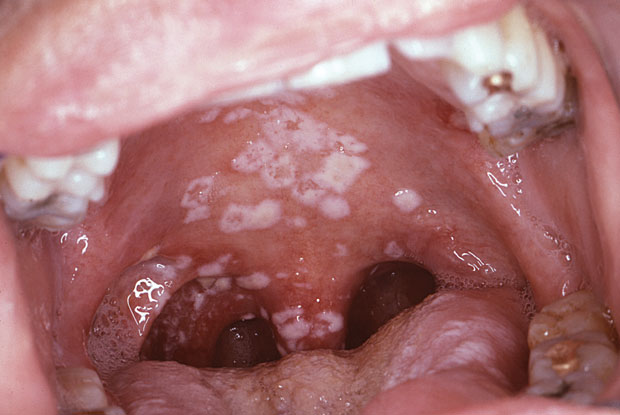MKSAP Quiz: Difficult and painful swallowing
A 43-year-old man is evaluated for difficulty with swallowing and painful swallowing. The pain began approximately 5 days ago and occurs with both solids and liquids. He has recently diagnosed HIV infection and is receiving antiretroviral therapy.

On physical examination, vital signs are normal. Oropharynx findings are shown.
The remainder of the examination is normal.
Previous laboratory studies revealed a CD4 cell count of 128/μL.
Which of the following is the most appropriate treatment?
A. Ganciclovir
B. Intravenous caspofungin
C. Oral fluconazole
D. Oral fluconazole and oral acyclovir
E. Upper endoscopy with biopsy and cytologic brushings
Answer and critique
The correct answer is C. Oral fluconazole. This item is Question 89 in MKSAP 19's Gastroenterology and Hepatology section.
The most appropriate treatment is oral fluconazole (Option C). This patient probably has Candida esophagitis given his dysphagia with odynophagia, HIV infection with low CD4 count, and oral thrush. In patients with these clinical characteristics, the provisional clinical diagnosis can be made and empiric treatment begun. The most common causative species is Candida albicans, which is treated with oral fluconazole.
Viral esophagitis, caused by herpes simplex virus (HSV) or cytomegalovirus, may also occur in immunocompromised patients. HSV esophagitis is treated with acyclovir, and cytomegalovirus is treated with ganciclovir (oral valganciclovir is also an option). Viral esophagitis, however, is typically associated more with odynophagia than with dysphagia. More important, the presence of oral thrush is highly predictive of Candida esophagitis; therefore, treatment with ganciclovir ( Option A) or acyclovir is not indicated as initial therapy. Endoscopy with biopsy is needed to confirm the diagnosis of viral esophagitis and should be performed if the patient does not respond to empiric antifungal treatment.
Intravenous echinocandin therapy with caspofungin (Option B), micafungin, or anidulafungin may be used in hospitalized patients with Candida esophagitis refractory to azole therapy. This patient does not have an indication for intravenous echinocandin therapy.
Simultaneous infection with Candida and HSV necessitating dual therapy with fluconazole and acyclovir ( Option D) would be unusual. The most likely diagnosis is Candida esophagitis, and empiric treatment with fluconazole alone is preferred. If viral esophagitis is suspected, endoscopy and biopsy are required for diagnosis and to direct therapy, rather than empiric antifungal and antiviral therapy.
If symptoms are atypical or do not respond to treatment, endoscopy with biopsy or cytologic brushings (Option E) may be performed to confirm the diagnosis and evaluate for other causes of dysphagia. However, the presence of oral thrush is highly predictive of Candida esophagitis in immunocompromised patients presenting with dysphagia and odynophagia. Infectious esophagitis can more rarely be caused by other viral, bacterial, and parasitic pathogens, including Lactobacillus species, β-hemolytic streptococci, Cryptosporidium species, Pneumocystis jirovecii, Mycobacterium avium complex, and Mycobacterium tuberculosis.
Key Points
- Candida esophagitis can be diagnosed clinically in patients with dysphagia and odynophagia, immunosuppression, and findings of oral thrush.
- Candida esophagitis can be treated with oral fluconazole.



